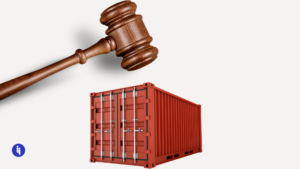Plus: Did a comic just crash Japan’s tourism?
|
Today’s briefing: |
Sponsored by: |
Good morning Intriguer. Sometimes you just need some non-sequitur humour, so here are three of my favourite social media accounts delivering exactly that:
-
La gente que está detrás (the people behind) zooms into the folks standing behind politicians in pics, curating a kaleidoscope of bored and bewildered expressions
-
People selling mirrors features, yes, people going to amusing lengths (or none at all) to avoid appearing in their own pics when trying to sell a mirror online, and
-
Actual names scours old census data to find, well, actual names that’ll give you a chuckle, whether it’s folks called Honest Winker or Flaming Gooch.
Anyway, with that palate-cleanser done, let’s get you up to speed on the very intriguing question of why Uganda’s military just cut ties with Germany!

PS – Don’t forget to share Intrigue this month using your unique referral link down below for your chance to win one of 24 signed copies of the must-have classic, In Praise of Idleness, by fellow Intriguer and international best-selling writer, Bradley Trevor Greive!

General Kainerugaba and Ambassador Schauer
Uganda's military announced on Sunday it's cutting all ties with Germany! Why?
-
Officially, it was "in response to credible intelligence reports that the current German Ambassador to Uganda His Excellency Mathias Schauer is actively engaged in subversive activities".
Now, that is an incredibly spicy allegation to make against a foreign ambassador. In fact, we'd go so far as to liken it to the Merciless Pepper of Quetzlzacatenango.
So what exactly did ol' Mathias get up to? Well, the generals won't say, though the head of the armed forces (and the president’s son / heir) later argued it's not a Germany thing. Rather, "it has to do with him as a person. He is wholly unqualified to be in Uganda."
Unqualified. Did he forget to do his annual mandatory online training?
Nope. Rather, we can triangulate the ambassador’s sin from a few clues:
-
Earlier this month, he (and other EU ambassadors) met Uganda's beleaguered opposition, now led by pop-star-turned-politician Bobi Wine. That’s kinda normal. But it's spicy in Uganda's authoritarian context, and the president's son / top general later warned that the ambassadors were "playing with fire"
-
The same day, the EU ambassador reportedly called out Uganda's pattern of arrests and torture of opposition figures ahead of next year's elections, and
-
Then just on Friday, those two ambassadors met another top general (Saleh, the president’s brother — see a pattern here?), to push back on the presidential son’s fiery tweets against ambassadors.
And it was against that backdrop that the military announced it was cutting all ties with Germany, citing those allegations spicier than a chilli grown deep in the jungle by inmates of an insane asylum (sorry, another Simpsons reference).
So, what's going on? The president's son and others have tried to frame it all as…
-
Anti-colonialism, pushing back on Europeans disrespecting locals, and
-
National security, alleging foreign-backed plots to destabilise the country.
It's also worth noting the president’s son / general (Kainerugaba) is what you might call a “loose unit” — he famously offered 100 cows as a bride price for Italian leader Giorgia Meloni (widely seen as a stunt, but it got him suspended by his dad).
Meanwhile, Germany is holding its tongue beyond rejecting the allegations as absurd, but the Germans are probably saying something like this behind the embassy gates:
-
This is a familiar pattern, with the regime raising the spectre of a foreign-backed insurgency in the months before each election to justify targeting the opposition, criminalising dissent, and/or distracting from any domestic failings
-
By calling-out an individual ambassador and circulating details of his private meeting, the regime is creating a pretext to declare his position untenable, and
-
This all sends a signal to every other ambassador in town: speak up this election cycle, or even be seen around the president's murky succession dynamics (Friday’s meeting with his brother), and you'll be next.
Intrigue’s Take
So… who cares? There are a few reasons why it’s worth caring.
First, if a foreign ambassador isn't safe in Uganda, then who is? Certainly not opposition voices, but as the net of alleged ‘foreign interference’ gets wider, it'll rattle investors and tourists, too — both critical drivers for the country's broader prosperity.
Second, it's part of a broader trend in East Africa. Just in the past week, someone abducted yet another Kenyan opposition figure, while disturbing details have emerged about Tanzania's treatment of supporters who tried to attend the opposition leader’s trial on bogus treason charges (both governments deny any role).
And third, it's arguably part of a trend everywhere: paranoid authorities bristling at outside scrutiny, and sensing a distracted or diluted international community, now seem emboldened to steamroll any individual, business, or organisation who gets in their way.
Sound even smarter:
-
It’s unclear how much military cooperation Germany actually has with Uganda, though the president's son has told local outlets it includes "intelligence, training, Somalia" (the latter being a reference to Uganda's participation in the African Union mission in Somalia, backed by the EU).
-
The son seems to have just tweeted (then deleted) an apology to his uncle (General Saleh) that also pledged to halt online jabs at European diplomats. 🤷
Today’s newsletter is sponsored by Growth School
Learn Million Dollar AI Strategies & Tools in this 3 hour AI Workshop. Join now for $0
Everyone tells you to learn AI but no one tells you where.
Growthschool is bringing this ChatGPT & AI Workshop to our readers. It is usually $199, but free for you because you are our loyal readers 🎁
This workshop has been taken by 1 Million people across the globe, who have been able to:
-
Build business that make $10,000 by just using AI tools
-
Make quick & smarter decisions using AI-led data insights
-
Write emails, content & more in seconds using AI
-
Solve complex problems, research 10x faster & save 16 hours every week
You’ll wish you knew about this FREE AI Training sooner (Btw, it’s rated at 9.8/10 ⭐)
Meanwhile, elsewhere…

 |
🇷🇺 RUSSIA – Trump calls Putin “absolutely CRAZY”. |
 |
🇪🇺 EUROPEAN UNION – US to delay EU tariffs ‘till July. Comment: von der Leyen says her bloc is ready to act “swiftly and decisively”, though that doesn’t necessarily mean substantively. The UK-US mini-deal suggests the hurdle for the White House to declare victory might be fairly attainable, and likely includes measures to box out China-based supply chains. |
 |
🇻🇳 VIETNAM – Paris and Hanoi sign Airbus deal during Macron visit. Comment: As Macron continues to pour effort into France’s international standing, we wonder to what extent it’s to distract from his low approvals at home, versus him sensing an opportunity to fill any perceived US vacuum abroad. Perhaps both. |
 |
🇯🇵 JAPAN – Did a 1990s comic book just crash tourism? |
 |
🇮🇷 Iran – The mullahs go green. |
 |
🇸🇷 SURINAME – Elections neck-and-neck in oil boom race. |
Extra Intrigue
🤣 Your roundup of the world’s lighter news
-
One lucky Norwegian man has woken to find a huge containership run aground in his backyard, narrowly missing his house.
-
The French town of Landerneau has broken a record after 3,000 folks in Smurf costumes gathered there. Weird but impressive (though no sign of Gargamel).
-
A lost DoorDash driver has somehow ended up roaming around the secure area of Chicago’s O’Hare airport for miles, potentially even crossing runways.
-
The world’s top chess grandmaster is playing a single game against 140,000 people, and thinks the match might be headed for a draw.
-
And it turns out the Magna Carta copy Harvard purchased for $27.50 back in 1946 is actually the real thing from the 1300s, worth well into the millions.
From our sponsors
Travel Smarter by Speaking the Language. Spring adventures are better when you can talk to the locals. With Babbel, you’ll learn real-world phrases, practical conversation skills, and cultural tips—so you can travel with confidence and make every moment count.
From Parisian cafés to Tokyo night markets, be the traveler who connects—not just the one who points at menus. Just 10 minutes a day is all it takes.
Intrigue presents
Millions listen to him every day. Now he gets to listen to you.
We’ll be chatting with legendary CNN journalist, author, and global affairs commentator Fareed Zakaria on the evolving media landscape and how societies respond in times of political, social, and economic change, online tomorrow (Wed 28 May). Sign up here!
Today’s poll
Do you think being an ambassador is riskier now than it was 20 years ago? |
Thursday’s poll: Do you think geopolitics is the single biggest risk to banks today?
🌍 Yes, it shapes everything else (81%)
🤔 No, because… (write in!) (19%)
Your two cents:
-
🌍 I.B: “The fact that Wall Street newsletters can't stop talking geopolitics is very telling.”
-
🤔 S.F: “All politics is local. Same with banking. The three Cs rule lending: character, collateral, and capacity.”
-
🤔 M.P: “You can't really manage geopolitical risk, beyond avoiding multipolar targets and creaky supply chains. Unless a bank is too big to fail they should be primarily focused on credit risk and cyber-crime risk.”






